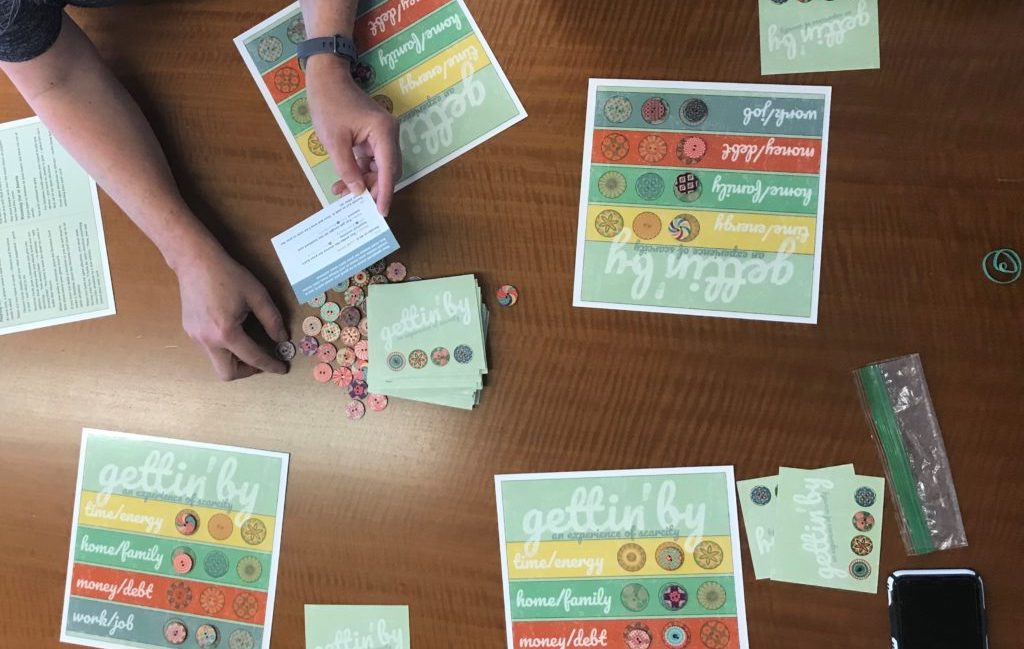Speakers Bureau Spotlight: Linda Riddell
Linda Riddell devotes her work to improving the well-being of people living in poverty. She developed gettin’ by to promote understanding of poverty’s impact on people — how they live, make decisions, and struggle. Unlike other poverty simulations, gettin’ by does not focus on money. The game is modeled after social science laboratory experiments that induce the poverty mindset. Players experience themselves the brain changes that happen to a person coping with poverty.
We asked Linda a couple of questions about her game, gettin’ by, and the connection between socioeconomic and health status.
How did you get into your field?
My fascination with poverty began in graduate school, where I learned the subtle and complex connection between socioeconomic and health status. I loved the mash-up of biological, social, economic, and psychological factors. I also saw that conventional wisdom about poverty and health was ignorant of what science had known for decades. This gap was what I wanted to fill.
I wondered what progress could be made if more people understood the science behind poverty’s impact on the body. On top of this, I kept up an unusual side hobby of reading about the human brain.
All of these factors came together when I learned that the poverty mindset could be induced in social science laboratory experiments. So, I designed the gettin’ by game to mimic these laboratory conditions and give people a first-hand experience of how poverty changes the brain, which in turn affects actions that shape health. My goal was to have people see poverty in an entirely different way.
I have spent five years developing, testing, and refining gettin’ by. It has been played by 150 people at national and regional conferences. It has been very well received and has sparked the “aha” moments that I had hoped for. I’m now working on ways to bring it to more audiences across the country.
Tell us a little bit about Gettin’ By.
Gettin’ by is a game where players have limited time and resources to make decisions. Game cards present players with a real-life scenario, adapted from published work by sociologists and ethnographers. They have various resources to apply – time, energy, family members, money, and job.
Purchase the game Gettin’ By at gettinby.net »
For example, a player might have a sibling needing a ride to an opiate addiction treatment clinic every day. If he agrees to do this, he spends a time/energy resource. If he says no, he loses a family asset.
As the game progresses, players run out of resources and have to make harsher tradeoffs.
There are two goals achieved by playing the game. One, players see life situations that are everyday events for low-income people; these may be surprising to some players. Two, the game forces the players to focus solely on the immediate need, leading them to make decisions differently. For example, a player who was a physician surprised herself when she chose to hang up the phone on an emergency room nurse; she didn’t have time and energy for it at that point in the game.
Why do you think the world needs it?
The chasm between people who have enough (or surplus) resources and those who have too little has widened in the United States. The need for empathy and understanding is also great. I hope that gettin’ by can open up new perspectives on poverty and inspire new ways to help people living in poverty. Many of the anti-poverty programs are not designed with the realities of poverty in mind. For example, government programs typically end benefits if paperwork is not completed and submitted on time; this is a heavy burden on people whose lives may unpredictable.
The world needs to understand and cope with poverty in new ways, ways that take into account poverty’s impact on a person’s decision-making and health. In whatever way that it can, gettin’ by strives to bring about that greater understanding.
Learn more about Linda Riddell
Linda Riddell is a member of the GoMo Health Speakers Bureau. Learn more about her and book her to speak at your event.








Find Us Online